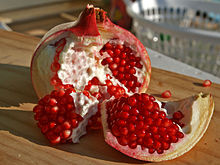Punicic acid

| |
| Names | |
|---|---|
| Preferred IUPAC name
(9Z,11E,13Z)-Octadeca-9,11,13-trienoic acid | |
| Identifiers | |
3D model (JSmol)
|
|
| ChEBI | |
| ChemSpider | |
PubChem CID
|
|
| UNII | |
CompTox Dashboard (EPA)
|
|
| |
| |
| Properties | |
| C18H30O2 | |
| Molar mass | 278.43 g/mol |
| Melting point | 44 to 45 °C (111 to 113 °F; 317 to 318 K) |
Except where otherwise noted, data are given for materials in their standard state (at 25 °C [77 °F], 100 kPa).
| |
Punicic acid (also called trichosanic acid) is a polyunsaturated fatty acid, 18:3 cis-9, trans-11, cis-13. It is named for the pomegranate, (Punica granatum), and is obtained from pomegranate seed oil. It has also been found in the seed oils of snake gourd.[1]
Punicic acid is a conjugated linolenic acid or CLnA; i.e. it has three conjugated double bonds. It is chemically similar to the conjugated linoleic acids, or CLA, which have two. It has also been classified as an "n-5" or "omega-5" polyunsaturated fatty acid. In lab rats, punicic acid was converted to the CLA rumenic acid (9Z11E-CLA).[2] In vitro, it shows anti-invasive activity against prostate cancer cells.[3] OLETF rats—a strain which becomes obese—remained relatively lean when punicic acid was added to their feed.[4]

See also
References
- ^ Cyberlipid. "POLYENOIC FATTY ACIDS". Archived from the original on 2018-09-30. Retrieved 2007-01-11.
- ^ Tsuzuki T, Kawakami Y, Abe R (1 August 2006). "Conjugated linolenic acid is slowly absorbed in rat intestine, but quickly converted to conjugated linoleic acid". J Nutr. 136 (8): 2153–9. doi:10.1093/jn/136.8.2153. PMID 16857834. Retrieved 2007-01-23.
- ^ Lansky E, Harrison G, Froom P, Jiang W (2005). "Pomegranate (Punica granatum) pure chemicals show possible synergistic inhibition of human PC-3 prostate cancer cell invasion across Matrigel". Invest New Drugs. 23 (2): 121–2. doi:10.1007/s10637-005-5856-7. PMID 15744587. S2CID 5867887.
- ^ Arao K, Wang Y, Inoue N, Hirata J, Cha J, Nagao K, Yanagita T (2004). "Dietary effect of pomegranate seed oil rich in 9cis, 11trans, 13cis conjugated linolenic acid on lipid metabolism in obese, hyperlipidemic OLETF rats". Lipids Health Dis. 3: 24. doi:10.1186/1476-511X-3-24. PMC 534798. PMID 15533261.